Sanya’s family estate was fifty miles north of Watchman’s Palace.
It sat just below the snowline, beneath a white ridge, in a field where the slope flattened, surrounded by evergreens. Its wings stretched out to the north and south. Above its wooden walls rose eaves and gables with curly-cue, pastel-painted trim. In the center, wooden onion domes layered with shingles like scales rose around the main building. Behind it were white snowfields, before it was a green meadow with tiny yellow and white flowers beginning to bloom. White butterflies like snowflakes flitted from blossom to blossom. A pink-bellied bird hopped across the top of the wall, letting out a low, mournful whistle before taking to the air, buffeted by the cool, gentle breeze. The scene looked idyllic; it looked safe.
Its lovely, flat meadow meant that anyone could see us approach.
I asked Sanya if I should stay in the woods. He could talk to his parents. I would stay right here, and when he was done, he could come get me. He could take as long as he wanted. I could go find a teahouse somewhere or, or I could just stay right here, in the shade and gloom.
“No,” he told me. “If I’m here, they will think you’re close by. They’ll look for you. I’m not letting you out of my sight.”
That was worrying, but all I could think to say was, “Why will they think I’m close by?”
“Because they know about you,” he said and did not elaborate.
The meadow seemed to stretch on forever as we walked across it, among the butterflies and birds, as the estate rose over us like some sleepy behemoth stretching its back. We were not halfway there when heads popped up from the wall, and not long thereafter, two figures emerged from a door in the gate. The door closed behind them, and they stood there waiting.
I looked over at Sanya. His face was flat, blank, his eyes unblinking. He, I was sure, was sharpening his vision, trying to recognize them. Would anyone recognize him? What if they didn’t believe him?
About twenty feet from the figures—a man and a woman, I thought, though it was difficult to tell under coats and hats—we stopped. I, from force of habit, stayed behind Sanya, on his right hand.
“Who are you, and what is your business?” the woman shouted. The breeze carried her voice to us.
Up on the wall, faces peered down at us, but I saw no weapons drawn yet, no hands up and ready to shoot.
Sanya pulled his shoulders back, his chest rising. “I am Aleksandr Artyomovich Okhotnikov,” he said. “I have returned.”
***
The guards did not know how to react.
They stood there, frozen, for a moment. Some of the heads on the wall disappeared, perhaps to whisper to each other.
Then, finally, the woman leaned into the man, said something with her head turned away from us, and the man went back through the door.
The woman faced us again, her feet planted shoulder-width apart and her arms crossed over her chest.
“What are they doing?” I whispered, trying to keep my lips as close together as possible.
“Finding someone who will know me,” Sanya said, making no attempt to be any quieter than his speaking voice naturally was.
He stood so perfectly still that it didn’t look like he was breathing. I trembled for him, thinking of Aksana’s great hall and her grief. There were far more terrible things in the world than what occurred in Aksana’s great hall, but I could think of none that felt worse than seeing how I broke the woman who raised me. That, in the best case, was what Sanya was in for now.
I was watching him so closely that I almost missed when the door opened again, and through it shuffled a tall, slightly stooped woman. She wore a bulky coat and a scarf wrapped around her head and neck, but between the hem of her coat and the tops of her boots a few inches of skinny, stockinged shins were revealed. Behind her trailed a boy still in the throes of adolescence, almost as skinny but not quite so tall. When she came out, Sanya took a sharp breath in, but he didn’t step forward.
The male guard followed the skinny woman and the boy out and closed the door behind them. The skinny woman kept walking forward, toward us.
The female guard said, “Chinovnitsa Ignatieva, I would caution against going closer.”
“Thank you, my lady, but I can’t see him from here,” she said as she passed. “My lord and lady can follow us if they wish.”
And they did, falling in at her heel as she approached. She got within ten or so feet of us, then stopped. She squinted at Sanya, “Please repeat for this servant your name.”
“My name is Aleksandr Artyomovich Okhotnikov,” he repeated.
She took a step closer, her lips mouthing something. I tensed, but then her eyes widened, and those lips trembled—just for a moment before they pressed flat. She took another step, stopped again.
“Dinya,” she said finally, not taking her eyes from Sanya. “Please fetch His Highness and the Lady Varvara.”
“Fetch His Highness and the Lady? But Chinovnitsa—”
“Go now, Dinya, and be quick about it.”
The boy gave one last pitiful look to her back before he turned and scampered to the gate.
“Chinovnitsa Ignatieva,” the female guard said.
“This servant believes he’s telling the truth,” Chinovnitsa Ignatieva said. “But she cannot be sure. It has been many years. Bring him into the great hall.”
“But if they mean us harm…”
“My lady, if they mean this house harm, you and my lord Boris will be there to protect it. This servant will humbly follow.” Before she turned around, she bowed to Sanya, and Sanya inclined his head slightly in return.
Though Chinovnitsa Ignatieva said she would humbly follow, she in fact led us, the guards flanking, through the wicket gate and up a wide, cobblestone road. Snow clung to the shadowy places in the courtyard around us. A collection of outbuildings in various states of humility and grandeur—including a freestanding chapel adorned with tens of gold-plated onion domes—crowded around the main structure, whose entrance loomed at the top of a wide set of wooden steps.
The doors were twice as tall as we were, and it was only here that Ignatieva paused and let the guards open them for her. The guards then led us through an antechamber, where a few baffled servants insisted on removing our coats and hats, then down a short, windowless corridor to another impressive set of doors.
Behind them was the great hall, a long, cavernous room with stairways on either side of the entrance that led up to second-story galleries and beyond, spidering up the walls and into darkness. Fires burned in hearths all along the walls, and at the far end of the room, curtains hung around a grand wooden throne set atop dais. The throne was empty.
Sanya strode across the hall like he hadn’t been gone a day, his stiffness vanished as though it dared not show its face here. I hurried after him. No one had yet asked about me, and perhaps if I remained in his shadow, it would stay that way.
He reached the foot of the dais and knelt down, bowing his head. I got down on my knees behind him, just to the right. I was a steward; that was all. Even if I didn’t have my officious little hat anymore. When I bowed my head, my eyeglasses (scratched and if anything obscuring my vision, now) slid down my nose.
The guards still stood behind us. With my head hanging, I could see their boots shifting. I was sure they were desperate to talk to each other. What excitement this must have been.
Ignatieva, on the other hand, I had lost somewhere between the corridor and the dais. She must have slipped away to talk to the lord and lady of the house.
The room hung in stilted silence. I was shifting uncomfortably, trying to inconspicuously look around the room and identify exits; the guards were shifting uncomfortably, probably with as little idea as to what was going on as I had; Sanya was kneeling perfectly still. Behind his hanging braids, I was sure his eyes were closed, as in prayer.
It was a trait universal to knyazes and khozyains, lords and ladies: they all liked to make people wait. I was prepared to sit there kneeling for hours, perhaps more given that we had truly surprised them.
But I had just barely made myself comfortable when I heard a door open. It wasn’t the doors at the front of the hall. It came from the second-story gallery, I believed, though I didn’t dare lift my head to check. An erratic drumroll of footsteps pounded across the floor.
At least one person was practically running down the stairs, and I half thought that some children—or a large halfwit, given the weight behind the steps—had managed to sneak through, maybe no one had thought to put guards on the doors, but then—
“Show your face,” a voice like Sanya’s amplified from the heavens called.
And though I knew he was talking to Sanya, I could not resist. I lifted my head, too.
Up on the dais, in front of the throne, stood a broad, sharp-nosed man with a thick, black beard and gold all in his thick, black braids. Behind him, a beautiful, generously proportioned young woman was still running down the stairs, skirts in her hands.
I might as well not have been there. Andrej Artyomovich was staring at the man knelt before him as though he could shoot fire from his eyes, but when Sanya lifted his head, his father’s face went slack. His mother, eyes childishly round and limpid, stopped and raised a slim white hand to her breast.
Then they were both moving again, and they were almost on top of him, and Sanya still hadn’t flinched.
His father cried, “For Tajna’s sake, Sasha, stand up!”
Sanya obliged, jerky as a marionette, and Andrej Artyomovich enveloped him in a bear hug. He wasn’t any taller than Sanya, but he still grabbed him around the waist and lifted him up off his feet. When he set him back down, Varvara Artyomovich moved in, taking her son’s face in her small hands, pulling him down so she could kiss him all over.
“Varya, Varya,” Andrej was saying. “Is that really him? That’s really our boy?”
Varvara, whether in response to this or because the situation had just now hit her, burst into tears.
Sanya drew her into his arms, whispering something in her ear and rubbing her back.
Andrej now hugged the both of them together and wiped his nose on his sleeve.
I was rooted to the spot, eyes peeled wide as coins. I had not expected—I didn’t know what I had expected. Maybe a staid, cordial greeting if I was being very optimistic. If someone were feeling particularly emotional, perhaps they might crease their brow or tighten the muscles at the corners of their lips. I had never seen an Okhotnikov cry, let alone two of them. Raise their voices.
My eyes were stuck on Andrej’s face as it pressed against Sanya’s back. His nose. Just like Vasilij’s.
This went on for several more minutes before someone brought a chair and Sanya helped Varvara into it, then knelt down at her side so she could pet his hair. Her face was red and swollen with more tears still rolling down it. Andrej produced a handkerchief from his doublet and dabbed at his wife’s face and his own and then, finally, finally, his eyes passed over me and stuck.
“Is this him?” Andrej said, and his voice was not booming now but quiet. Sharp.
Sanya tore his eyes off his mother. (It was strange to call this woman who looked a decade or more younger than he was his mother. His father, at least, had a thick beard that disguised his age entirely.) He looked between me and his father. “This is him,” he said.
Andrej Artyomovich squared his shoulders and looked down his nose at me where I knelt.
“Andrej Artyomovich, it’s an honor to meet you and Lady Varvara.”
His beard bristled as his lips pressed flat. He turned to the guards. “You may leave now.”
They bowed and turned on their heels, and while their echoing footsteps retreated across the hall, we hung in silence. I bowed my head again, but I could feel his eyes on me.
The doors closed; the silence persisted.
Finally, Sanya said, “Papa…”
“Iyu Ony.” Andrej opened his mouth, then closed it, then turned back to Sanya. “Have you been with him all this time?”
“No,” Sanya said. “He had nothing to do with it.” That sounded suspiciously like a lie.
“Then why did you leave us?” Lady Varvara said.
“He’s here now,” Andrej said with sudden passion. “I don’t care where he’s been.”
“Of course not.” Varvara met her husband’s gaze and pulled Sanya’s hand up to her porcelain-doll face. “And I don’t care who he’s brought with him, either.”
Andrej regarded his wife and his son for a moment and sighed. “Of course not. Iyu Ony”—he took a sharp breath in, looking at me with eyes like burning coals—“welcome to Snyezhnaya Polyana.”

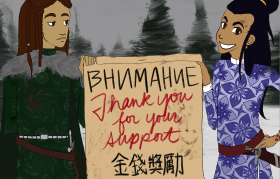
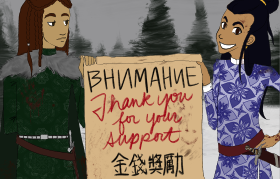
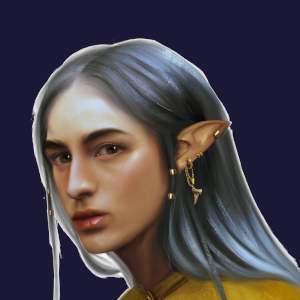
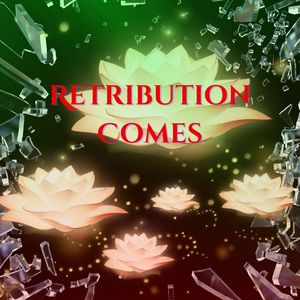



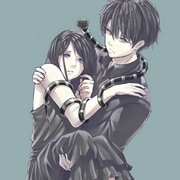



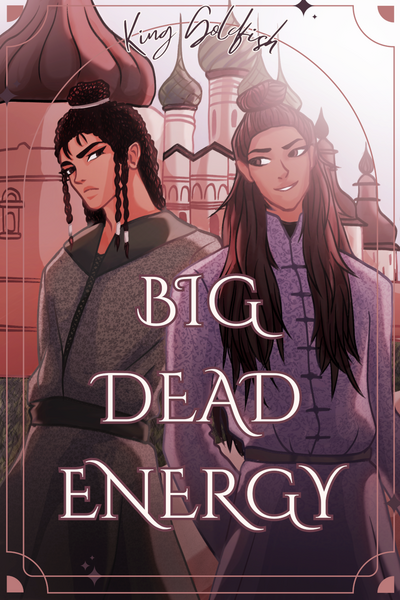
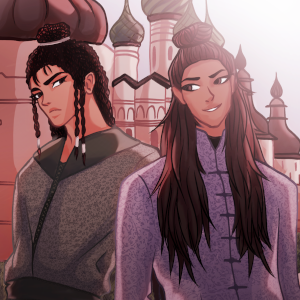
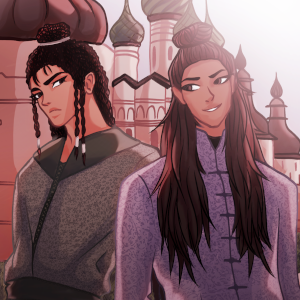
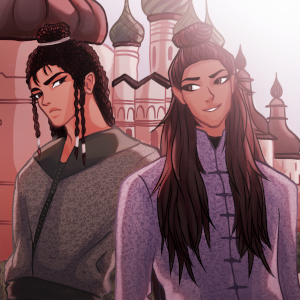
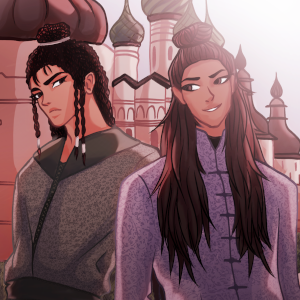
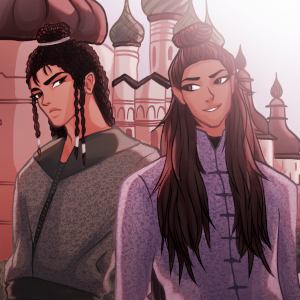
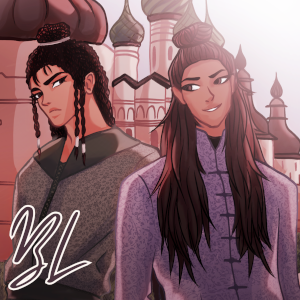
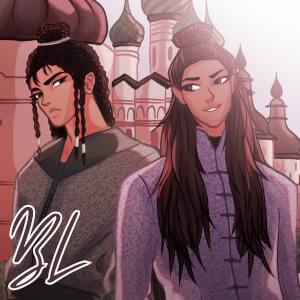
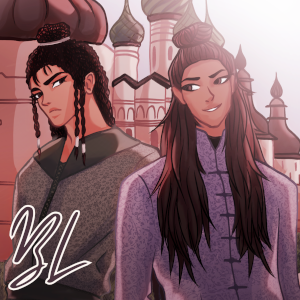
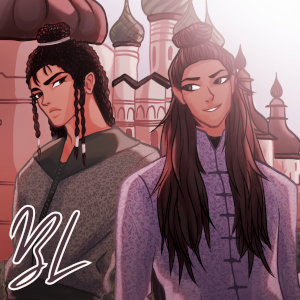
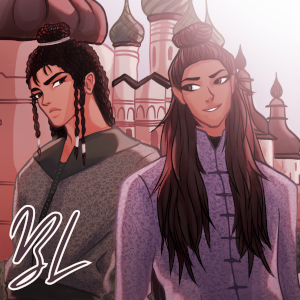
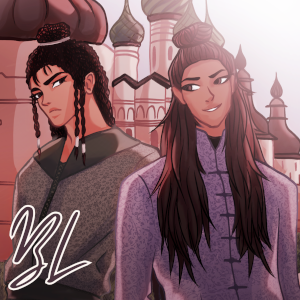
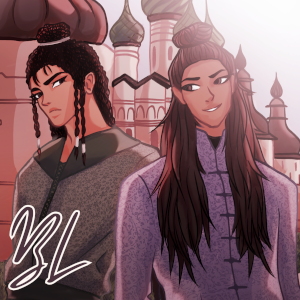
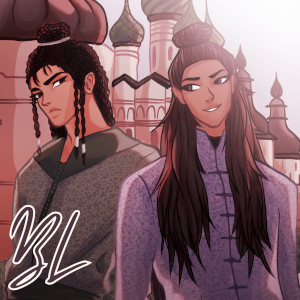
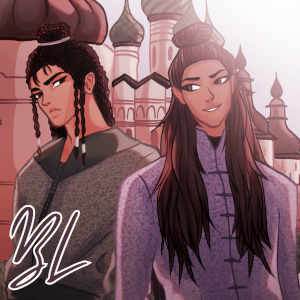
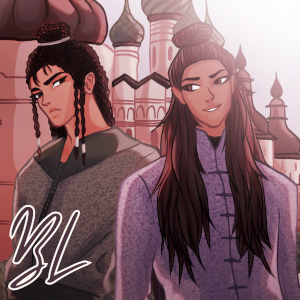
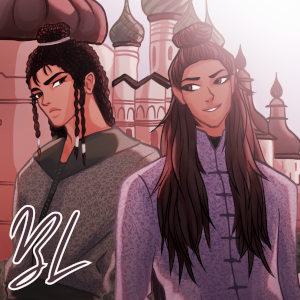
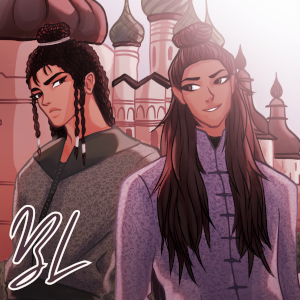
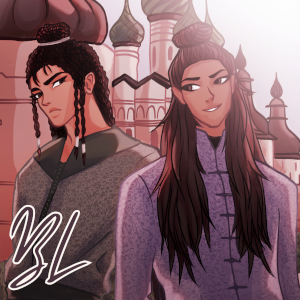
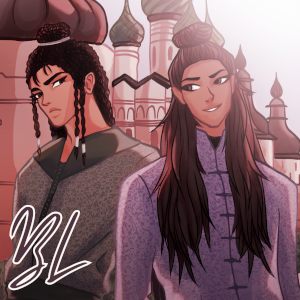
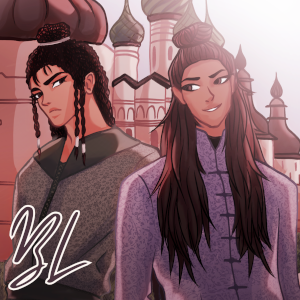
Comments (4)
See all